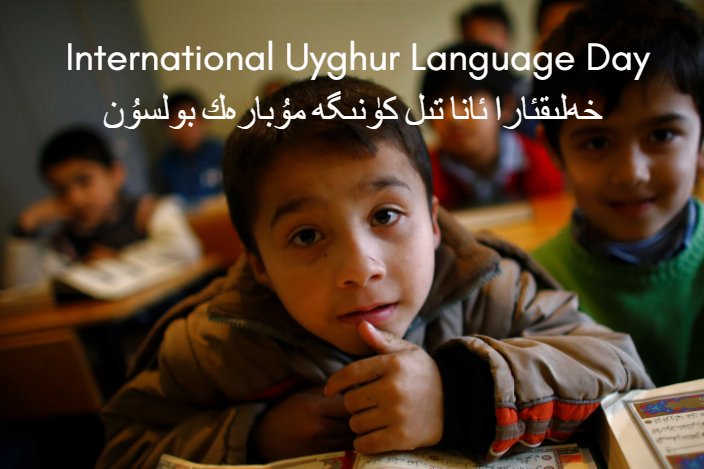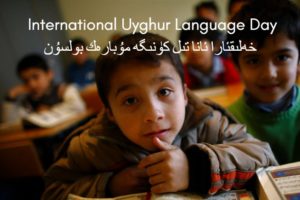PRESS RELEASE: WUC Celebrates the Importance of Language on International Uyghur Language Day 2018

Press Release – For immediate release
15 June 2018
Contact: World Uyghur Congress www.uyghurcongress.org
0049 (0) 89 5432 1999 or [email protected]
 On June 15th, the WUC celebrates the unique Uyghur language and its importance to Uyghur culture, history and society, in recognition of International Uyghur Language Day 2018.
On June 15th, the WUC celebrates the unique Uyghur language and its importance to Uyghur culture, history and society, in recognition of International Uyghur Language Day 2018.
Language is an essential part of the social fabric and identity of any people, encapsulating thousands of years history and traditions in spoken and written word. It forms an important bond between the Uyghur people and structures their experience of the world. It ties generations of Uyghurs together with one common thread, uniting the Uyghur diaspora scattered across the world with relatives and countrymen in East Turkestan.
However, the Uyghur language has come under attack from a series of repressive policies introduced by the Chinese government. While efforts to undermine the use of the Uyghur language have been ongoing for decades, we have witnessed a marked escalation in these efforts in the past 5 years.
The Uyghur language has been under threat for many years as assimilatory policies focus on language as a central element of identity. The strategy of the Chinese government has focused especially on influencing young Uyghurs in an attempt to diminish the importance of the Uyghur language with the younger generations and sever their ties to their ethnic Uyghur identity. The approach appears to have two main focuses: discouraging the use of the Uyghur language among young Uyghurs through language bans and ‘bi-lingual’ education classes and encouraging the use of Mandarin Chinese through preferential access to employment, universities and government positions to those who speak Mandarin. Chinese efforts to assimilate the Uyghur population have been acknowledged in official policy, with Xi Jinping and his allies have explicitly referenced ‘ethnic intermingling’ as the policy solution to ethnic issues in China.
While learning Mandarin is not wrong in itself, it is the Chinese government’s efforts to totally erode Uyghur language and replace it with Mandarin that is problematic.
For the regional government, ‘bilingual education’ does not mean to maintain both Mandarin and Uyghur at the same level in terms of teaching, but to transition Uyghur students at all levels from education in their mother tongue to education in Chinese. In practice, the program prohibits young Uyghurs from being taught in the Uyghur language and even prevents them from speaking to one another in their mother tongue between classes or on campuses.
It reveals that the Chinese government’s intention is not to promote communication and intercultural dialogue, but to supplant the Uyghur language. It shows that the Chinese government does not appreciate and celebrate the Uyghur identity, as it claims to, but rather has increasingly had a homogenous conception of ‘China’ with the Han-Chinese ethnicity at its centre. In this approach by the Chinese government, there is an inherent false assumption that Chinese language and culture is superior, that Uyghur language and culture is disposable or even a hindrance.
It is worth noting that learning the Uyghur language is not a prerequisite for Han Chinese students in the region and the rest of China.
This past year, Chinese authorities have done away with any pretense of promoting Uyghur and Mandarin simultaneously and have instead opted to implement a ban on the use of the Uyghur language at all levels of education in the Hotan prefecture. The ban went into effect on 1 September 2017, at the start of the school semester. It not only bans the use of Uyghur as the language of instruction in classroom, but also prevents Uyghur students from speaking Uyghur outside of class on school premises. Given the Chinese government’s propensity for testing policies at a lower level before enacting them as national policy, we are very concern that the language ban will soon extend to the whole region.
The right of children to receive an education in their native language is enshrined in international law, most explicitly in the Convention on the Rights of the Child, the International Covenant on Civil and Political Rights, as well as China’s own Regional Ethnic Autonomy Law. Learning in one’s native language is very important in the formation of cultural identity and, as the most recent Annual Report from the Special Rapporteur on the right to education emphasizes, “Students learn best when they are taught in their native language.” The language ban is therefore in clear violation of international law, China’s own domestic law and human rights norms.
The WUC therefore recalls the tremendous importance of the freedom to use one’s own mother tongue – something that cannot be denied to millions of Uyghurs in China. We urge the people from around the work to join us in learning about and celebrating the Uyghur language on this day. The international community must speak out about the cultural assimilation and denial of linguistic rights of the Uyghur people. Although there have been some encouraging developments, such as the recent United Nations Special Procedures communicationsent to China on the Uyghur language ban in the Hotan prefecture, we all must do more to ensure the continued use and survival of the Uyghur language.

